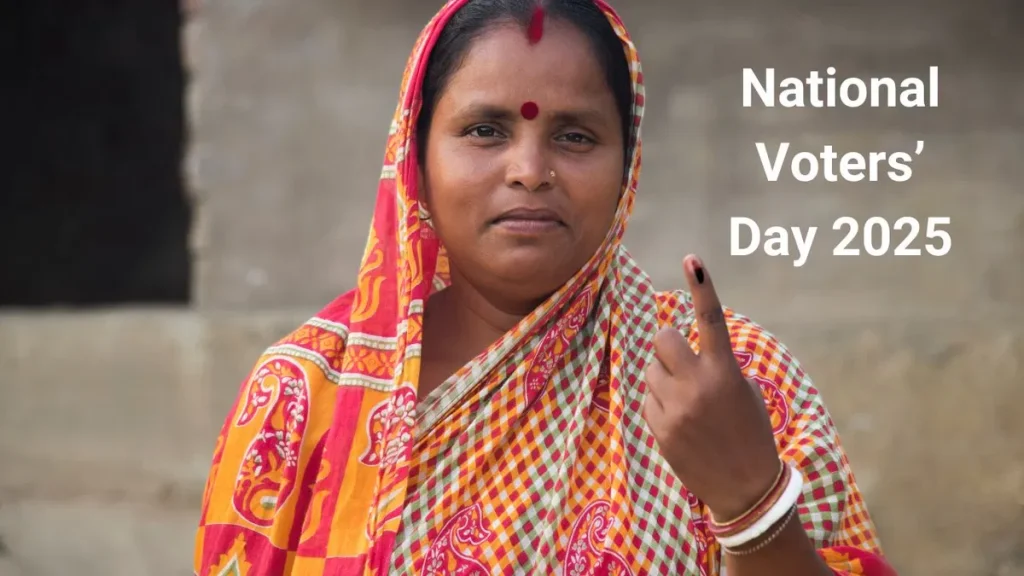Context:
India celebrated the 15th National Voters’ Day (NVD) on 25th January.
More on the News

- This year’s celebration comes soon after the historic and successful conduct of the 2024 Lok Sabha Elections, the largest democratic exercise in the world.
- The Election Commission also celebrated 75 years of its dedicated service to the nation.
- This year’s (2025) theme “Nothing Like Voting, I Vote for Sure” is a continuation of last year’s theme emphasizing the importance of participation in the electoral process.
- The first copy of the Election Commission of India (ECI) Coffee Table Book titled “India Votes 2024: A Saga of Democracy” was also presented to the President of India by the Chief Election Commissioner.
- An ECI publication “Belief in the Ballot: Human stories shaping India’s 2024 elections” was also presented to the President of India by the Commission.
National Voters’ Day
- In 2011, the government of India decided to celebrate January 25 every year as “National Voters’ Day” on the Election Commission’s foundation date of 25th January 1950.
- This event aims to underline the centrality of the voter and raise electoral awareness among citizens and inspire their active participation in the democratic process.
- The day is dedicated to the voters of the nation, and also promotes the enrolment of new voters, particularly young individuals who have recently become eligible.
Electoral Database Statistics
The electoral database now stands at 99.1 crore including 21.7 crore young electors, in the 18-29 age group.
India’s Electoral Gender Ratio (EGR) also increased from 948 in 2024 to 954 in 2025.
- EGR is the ratio between the number of males and females enrolled as electors. Normally, it is calculated as how many female electors are present in the Electoral Roll against 1000 male electors.
The Election Commission of India (ECI)
It is an autonomous constitutional authority (Article 324) established on January 25, 1950, a day before India became a Republic.
ECI administers elections to the Lok Sabha, Rajya Sabha, and State Legislative Assemblies, and the offices of the President and Vice President of the country.
- The Election Commission of India is not concerned with the elections to Panchayats and Municipalities in the states. For this, the Constitution of India provides for a separate State Election Commission for each state.
The President appoints a Chief Election Commissioner (CEC) and such number of other Election Commissioners (ECs) as he deems fit.
Since 1993, the Election Commission has been functioning as a multi-member body consisting of a Chief Election Commissioner and two Election Commissioners.
- CEC & ECs have tenure of six years, or up to the age of 65 years, whichever is earlier.
- CEC & ECs enjoy the same status and receive salary and perks as available to Judges of the Supreme Court of India.
- CEC can be removed from office in like manner and on like grounds as a judge of the Supreme Court.
In 2023, the Parliament passed the Chief Election Commissioner and Other Election Commissioners (Appointment, Conditions of Service and Term of Office) Act, 2023 which provided for a three-member Selection Committee for appointment of CEC and ECs.
- The Selection Committee consists of the Prime Minister as Chairperson, the Leader of the Opposition in Lok Sabha (or leader of the single largest party in the Lok Sabha) as member, and a Union Cabinet Minister nominated by the Prime Minister as a member.
- Recommendations of the Selection Committee will be valid even when there is a vacancy in this Committee.
- A Search Committee headed by the Minister of Law and Justice and comprising two other members not below the rank of Secretary to the Government of India will shortlist names for the consideration of the Selection Committee.

